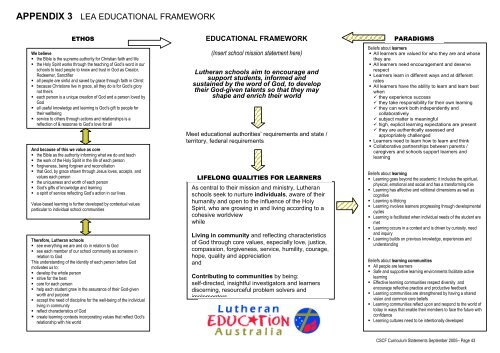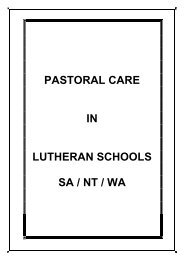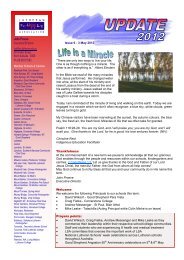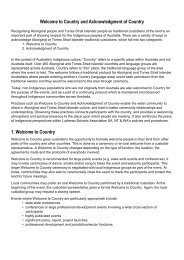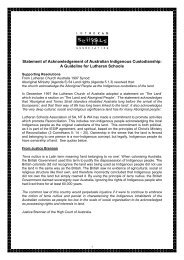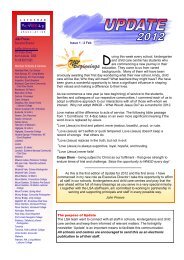2012 CSCF Curriculum Statements.pdf - Lutheran Schools ...
2012 CSCF Curriculum Statements.pdf - Lutheran Schools ...
2012 CSCF Curriculum Statements.pdf - Lutheran Schools ...
You also want an ePaper? Increase the reach of your titles
YUMPU automatically turns print PDFs into web optimized ePapers that Google loves.
APPENDIX 3 LEA EDUCATIONAL FRAMEWORKETHOSWe believe• the Bible is the supreme authority for Christian faith and life• the Holy Spirit works through the teaching of God’s word in ourschools to lead people to know and trust in God as Creator,Redeemer, Sanctifier• all people are sinful and saved by grace through faith in Christ• because Christians live in grace, all they do is for God’s glorynot theirs• each person is a unique creation of God and a person loved byGod• all useful knowledge and learning is God’s gift to people fortheir wellbeing• service to others through actions and relationships is areflection of & response to God’s love for allAnd because of this we value as core• the Bible as the authority informing what we do and teach• the work of the Holy Spirit in the life of each person• forgiveness, being forgiven and reconciliation• that God, by grace shown through Jesus loves, accepts andvalues each person• the uniqueness and worth of each person• God’s gifts of knowledge and learning• a spirit of service reflecting God’s action in our livesValue-based learning is further developed by contextual valuesparticular to individual school communitiesTherefore, <strong>Lutheran</strong> schools• see everything we are and do in relation to God• see each member of our school community as someone inrelation to GodThis understanding of the identity of each person before Godmotivates us to:• develop the whole person• strive for the best• care for each person• help each student grow in the assurance of their God-givenworth and purpose• accept the need of discipline for the well-being of the individualliving in community• reflect characteristics of God• create learning contexts incorporating values that reflect God’srelationship with his worldEDUCATIONAL FRAMEWORK(Insert school mission statement here)<strong>Lutheran</strong> schools aim to encourage andsupport students, informed andsustained by the word of God, to developtheir God-given talents so that they mayshape and enrich their worldMeet educational authorities’ requirements and state /territory, federal requirementsLIFELONG QUALITIES FOR LEARNERSAs central to their mission and ministry, <strong>Lutheran</strong>schools seek to nurture individuals, aware of theirhumanity and open to the influence of the HolySpirit, who are growing in and living according to acohesive worldviewwhileLiving in community and reflecting characteristicsof God through core values, especially love, justice,compassion, forgiveness, service, humility, courage,hope, quality and appreciationandContributing to communities by being:self-directed, insightful investigators and learnersdiscerning, resourceful problem solvers andimplementersadept, creative producers and contributorsopen, responsive communicators and facilitatorsprincipled, resilient leaders and collaboratorscaring, steadfast supporters and advocatesPARADIGMSBeliefs about learners• All learners are valued for who they are and whosethey are• All learners need encouragement and deserverespect• Learners learn in different ways and at differentrates• All learners have the ability to learn and learn bestwhen they experience success they take responsibility for their own learning they can work both independently andcollaboratively subject matter is meaningful high, explicit learning expectations are present they are authentically assessed andappropriately challenged• Learners need to learn how to learn and think• Collaborative partnerships between parents /caregivers and schools support learners andlearningBeliefs about learning• Learning goes beyond the academic: it includes the spiritual,physical, emotional and social and has a transforming role• Learning has affective and volitional dimensions as well ascognitive• Learning is lifelong• Learning involves learners progressing through developmentalcycles• Learning is facilitated when individual needs of the student aremet• Learning occurs in a context and is driven by curiosity, needand inquiry• Learning builds on previous knowledge, experiences andunderstandingBeliefs about learning communities• All people are learners• Safe and supportive learning environments facilitate activelearning• Effective learning communities respect diversity andencourage reflective practice and productive feedback• Learning communities are strengthened by having a sharedvision and common core beliefs• Learning communities reflect upon and respond to the world oftoday in ways that enable their members to face the future withconfidence• Learning cultures need to be intentionally developed<strong>CSCF</strong> <strong>Curriculum</strong> <strong>Statements</strong> September 2005– Page 43


